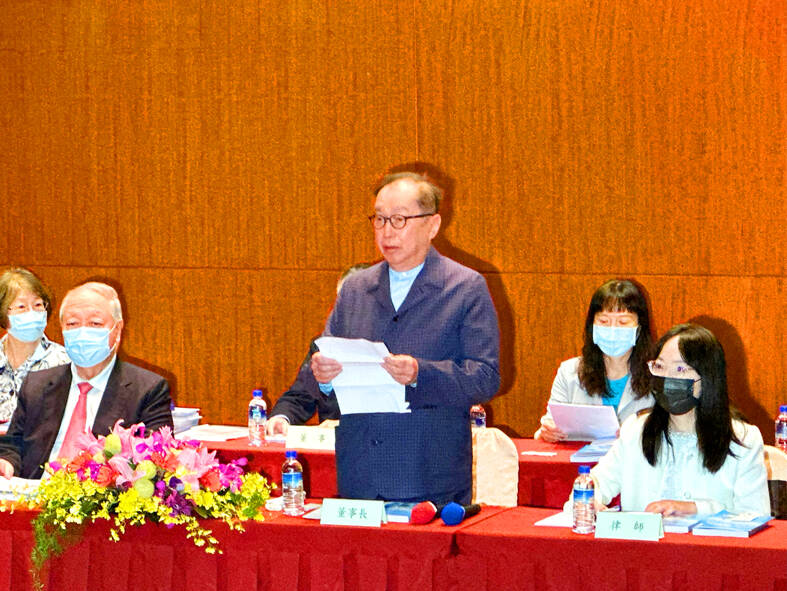Barry Lam (林百里), chairman of Quanta Computer Inc (廣達), one of the world’s largest manufacturers of notebook computers and other electronics, has been named the richest person in Taiwan, as the artificial intelligence (AI) trend continues to boom and boost the value of his company, Forbes magazine said.
Forbes’ real-time billionaires list showed Lam’s net worth at US$9.3 billion as of 1pm on Friday last week, securing him the top spot in Taiwan and the 226th worldwide.
After Lam, footwear tycoon Zhang Congyuan (張聰淵), who founded shoe manufacturer Huali Industrial Group (華利實業集團) in 2004 and now runs factories in China, Vietnam and the Dominican Republic, took the second spot in Taiwan and was ranked 297th in the world on the back of his net worth of US$7.7 billion.

Photo: CNA
With a net worth of US$7.4 billion, Terry Gou (郭台銘), founder of the world’s largest contract electronics maker, Hon Hai Precision Industry Co (鴻海精密), ranked third in Taiwan and 326th worldwide, followed by Lin Shu-hong (林書鴻), cofounder of the petrochemical conglomerate Chang Chun Group (長春集團), who ranked fourth in Taiwan and 347th worldwide with a net worth of US$7.2 billion.
Next on the list is snack and beverage brand Want Want Group (旺旺集團) chairman Tsai Eng-meng (蔡衍明), who took the fifth spot in Taiwan and 430th worldwide with a net worth of US$6.3 billion.
The value of Lam’s company, Quanta, has moved sharply higher partly due to a statement in May by Jensen Huang (黃仁勳), founder and CEO of graphics processing unit maker Nvida Corp, on how his company needed the support of Quanta Cloud Technology Inc (雲達科技) to manufacture world-class servers and data centers, market analysts said.
Lisa Su (蘇姿丰), chair and CEO of Advanced Micro Devices Inc (AMD), is also scheduled to visit Taiwan soon, further boosting the AI frenzy on the local stock market and leading to greater demand for Quanta shares, analysts added.
Since the beginning of May, Quanta shares have risen 127 percent and closed at NT$195 on Thursday, with the stock peaking at NT$206.50 during the session, its highest level in 23 years.
At its annual general meeting on June 16, Lam told Quanta’s shareholders that the company decided six years ago to focus on AI gadget development, and that the company “was just lucky as it made a right decision.”
One Asian brokerage said in a recent research report that Quanta was expected to benefit from rising demand for gadgets used in AI and electric vehicles, adding that the company could grab more than 20 percent of the global AI server market.
Lam, who was born in Shanghai in 1949 and raised in Hong Kong, has a master’s degree in electrical engineering from National Taiwan University.
In 1988, Lam and C.C. Leung (梁次震), a friend from Hong Kong, set up Quanta with paid-in capital of NT$30 million (US$971,094 at the current exchange rate).
Quanta, which counts top global brands such as Dell among its clients, saw its notebook computer shipments top 1 million for the first time in 1998.

With an approval rating of just two percent, Peruvian President Dina Boluarte might be the world’s most unpopular leader, according to pollsters. Protests greeted her rise to power 29 months ago, and have marked her entire term — joined by assorted scandals, investigations, controversies and a surge in gang violence. The 63-year-old is the target of a dozen probes, including for her alleged failure to declare gifts of luxury jewels and watches, a scandal inevitably dubbed “Rolexgate.” She is also under the microscope for a two-week undeclared absence for nose surgery — which she insists was medical, not cosmetic — and is

CAUTIOUS RECOVERY: While the manufacturing sector returned to growth amid the US-China trade truce, firms remain wary as uncertainty clouds the outlook, the CIER said The local manufacturing sector returned to expansion last month, as the official purchasing managers’ index (PMI) rose 2.1 points to 51.0, driven by a temporary easing in US-China trade tensions, the Chung-Hua Institution for Economic Research (CIER, 中華經濟研究院) said yesterday. The PMI gauges the health of the manufacturing industry, with readings above 50 indicating expansion and those below 50 signaling contraction. “Firms are not as pessimistic as they were in April, but they remain far from optimistic,” CIER president Lien Hsien-ming (連賢明) said at a news conference. The full impact of US tariff decisions is unlikely to become clear until later this month

GROWING CONCERN: Some senior Trump administration officials opposed the UAE expansion over fears that another TSMC project could jeopardize its US investment Taiwan Semiconductor Manufacturing Co (TSMC, 台積電) is evaluating building an advanced production facility in the United Arab Emirates (UAE) and has discussed the possibility with officials in US President Donald Trump’s administration, people familiar with the matter said, in a potentially major bet on the Middle East that would only come to fruition with Washington’s approval. The company has had multiple meetings in the past few months with US Special Envoy to the Middle East Steve Witkoff and officials from MGX, an influential investment vehicle overseen by the UAE president’s brother, the people said. The conversations are a continuation of talks that

CHIP DUTIES: TSMC said it voiced its concerns to Washington about tariffs, telling the US commerce department that it wants ‘fair treatment’ to protect its competitiveness Taiwan Semiconductor Manufacturing Co (TSMC, 台積電) yesterday reiterated robust business prospects for this year as strong artificial intelligence (AI) chip demand from Nvidia Corp and other customers would absorb the impacts of US tariffs. “The impact of tariffs would be indirect, as the custom tax is the importers’ responsibility, not the exporters,” TSMC chairman and chief executive officer C.C. Wei (魏哲家) said at the chipmaker’s annual shareholders’ meeting in Hsinchu City. TSMC’s business could be affected if people become reluctant to buy electronics due to inflated prices, Wei said. In addition, the chipmaker has voiced its concern to the US Department of Commerce